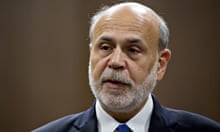Central banks will push western economies into recession in order to be sure of winning the battle against inflation, one of Jeremy Hunt’s advisers has warned.
Rejecting the idea of a “soft landing”, Karen Ward, a member of the chancellor’s economic advisory council, said there would need to be signs of weakness before policymakers felt able to ease their tough approach.
“The likelihood of a recession I think is still high,” Ward told Bloomberg TV. “That’s what’s going to get rid of inflation.”
Ward is a strategist at JP Morgan Asset Management but is also one of the economic experts Hunt calls upon for independent advice.
While the US, eurozone and UK economies all performed more strongly than anticipated in the first half of 2023, Ward said the good news was unlikely to continue.
The message from last weekend’s gathering of central bankers in Jackson Hole, Wyoming, was that borrowing costs would need to be “higher for longer” than financial markets were anticipating, Ward told Bloomberg.
Her remarks came as the latest data from Germany showed annual wage growth running at 6.6% in the second quarter of 2023 – up from 5.6% in the first quarter and the highest figure since modern records began in 2008.
Ward said: “Markets bought into this idea that we could have resilient growth across the west and yet all those inflation pressures would disappear on their own and the central banks could move from tightening to easing. Sadly, I think it is going to require that weakness.”
Jerome Powell, the chairman of the US Federal Reserve, Christine Lagarde, the president of the European Central Bank, and Ben Broadbent, one of the Bank of England’s deputy governors, all told the Jackson Hole event that it was too soon to say whether interest rates had peaked.
Broadbent said the knock-on effects of the surge in prices – such as pressure on employers to push up wages – were unlikely to fade away as rapidly as they emerged.
after newsletter promotion
“As such, monetary policy may well have to remain in restrictive territory for some time yet,” he said.
Giving her verdict on Jackson Hole, Ward said: “The message from all of them in different ways was that we are not confident the job is done, we are not confident we are sustainably heading back toward 2% [inflation],” Ward said.
“Until it’s really clear that activity is loosening the labour market, that wage pressures are easing, we cannot be convinced we are back to 2%. So that does leave us in a higher-for-longer world.”










